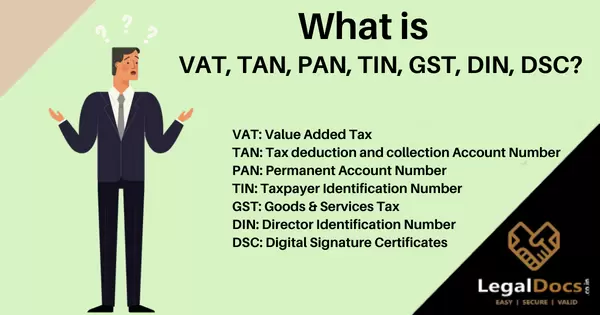All about VAT, TAN, PAN, TIN, GST, DIN and DSC
As soon as entrepreneurs start or plan to start a new business, they begin to hear these terms like VAT, TAN, PAN, GST, DIN, and DSC more frequently. Meanwhile, an entrepreneur plans things and comes up with business strategies, there are also legal requirements that the business must fulfill. These legalities are important at every step of setting up the business and further running it. Therefore, it first becomes important to know them completely.
Here is a list of few terms that are commonly used in the business world:
VAT: Value Added Tax or VAT is a type of tax that is assessed on the increased value of product and service. It is levied on the sale of goods and services such that though it is paid by the producers to the government, the burden of tax ultimately falls on the consumers. It is calculated as the difference between the input tax and the output tax. This indirect tax is a multi-stage tax levied on each stage of production of goods and services which involves sale and purchase of inputs also. It reduces the chances of tax evasion. The transparency in the sale of goods and services further fosters tax compliance.
TIN: Taxpayer Identification Number (TIN number) is also referred to as Value Added Tax (VAT) Number or CST Number. Allotted by the Commercial Tax Department of respective state governments, this eleven-digit number is mandatory to mention on all VAT related transactions. Therefore, registration for VAT or TIN is a must for any businesses dealing in the sale of goods or products, manufacturing, export, shop-keeping, dealing, e-commerce, etc. Any firm which is making an annual turnover of more than INR 5 lakhs was required to register for VAT.
The documents required for VAT or TIN registration are:
Copy of PAN card.
Address proof of business entity.
Proof of identity of promoters.
Additional security deposit or security.
TAN: Tax deduction and collection Account Number that is often referred as TAN is a unique ten digit number given to individuals who deduct tax at source (or TDS). In simple words, it is essential to obtain this number, if one wants to collect or deduct tax on various goods. After obtaining this number, the returns can be filed on a quarterly basis. The Tax deduction and collection Account Number starts with alphabets, followed by numerical digits, and again ends with an alphabet. For the purpose of registration, no particular proof of identity is required. One needs to fill Form 49B and submit it through a process electronically facilitated by the Income Tax Department. Payment of the fees for the same can be done through demand draft or cheque or credit card or debit card or maybe through net banking. Signature or left thumb impression has to be provided in the box provided in the acknowledgment.
PAN: Permanent Account Number (or PAN) is a ten-digit numeric number. It is issued to individuals who are earning some income such that they are liable to pay tax. Issued by the Income Tax Department, the number once issued is valid for a lifetime of the individual. It is mandatory for any individual to apply for company incorporation as well as for starting a Limited Liability Partnership. On one hand, it keeps an eye on the transactions that an individual make, on the other hand, is required to conduct a number of transactions such as receiving a bank loan or purchasing a property, and many more. Since PAN card can also be issued to foreign nationals, it cannot be used as a proof of Indian nationality.
Following documents are required for applying of a PAN card online:
Identity proof: may be a photo id, ration card, passport, driving license, arm’s license, Aadhar card, pensioner’s card.
Address proof: Copy of electricity bill, landline telephone bill, water connection bill, and gas connection card that is not more than three months old, bank account statement, passport, passport of the spouse, voter ID card, Aadhar card, domicile certificate issued by the government.
Proof of date of birth: Birth certificate issued by the Municipal Corporation.
GST: Post the tax reform in 2017, all business entities that were previously registered under VAT or TIN registration shall now have to obtain GST Registration. This is because the Goods and Sales Tax (GST) has replaced all other indirect taxes that existed. With this new tax regime, any business entity that is involved in the supply of goods and services in the states of India has an annual turnover exceeding INR 20 lakhs shall apply for GSTIN. The threshold limit is INR 10 lakhs for states belonging to special categories, that include the North Eastern Hilly states.
The documents required for GST Registration are:
PAN card of the company.
Aadhar card.
Proof of constitution of the business that may be in the form of a partnership deed, Memorandum of Association (MoA) or Articles of Association (AoA), certificate of incorporation.
Details and address proof of place of business like rent agreement or electricity bill.
A canceled cheque of the bank account or bank account statement showing the name of the account holder, MICR code, IFSC code, and bank branch details along with a digital signature.
List of partners and all authorized signatory with their identity and address proof with photographs in case of partnership firms. For companies, one needs to give a list of directors with their identity and address proof with photographs. A letter of authorization or Board Resolution for Authorized signatory may also be required.
DIN: Companies Act requires that every director must obtain an identification number from the central government. Ministry of Corporate Affairs issues them a Director Identification Number (also referred as DIN), such that it is mandatory to obtain it before beginning the incorporation process. Though it can be obtained any an individual irrespective of the nationality to which one may belong, address proof and identity proof are mandatory to submit. It is only then that DIN is issued.
DSC: Digital Signature Certificate or DSC is a type of certificate that is given to directors. It serves as a proof of identity for them. Since these days, must of the transactions and documentation is done online, an electronic signature is essential for authorization. Further, it is used for the purposes of employee provident fund, income tax department, and extenders. There are different kinds of classes that are used for different kinds of purpose such as class 1, class 2, and class 3. Class 1 certificate is issued to individuals or private subscribers. Class 2 certificates are issued to business personals and private individuals. It is therefore used for income tax filing and company registration. Class 3 certificate is issued to individuals as well as organizations.
The documents required for obtaining a DSC are:
Identity proof: passport, PAN card of individual, driving license, post office ID card, bank account passbook, any government issued photo ID card.
Address proof: Aadhar card, voter ID card, driving license, water, and electricity bill that are not older than three months, latest bank statements, GST registration certificate, Municipal Corporation receipt.
A self-attested copy of the ID card or address proof of the attesting officer must be provided along with the above-mentioned documents.
Why is it important to know these terms?
All these are a part of legal compliances that every business entity in India shall follow. While changes occur in these compliances from time to time. For instance, VAT is replaced by GST. This is done for the ease of the business and has also reduced many other indirect forms of taxes that a business had to face. It is beneficial for any business to know these terms and follow these compliances for the following reasons:
Avoidance of criminal activities: No business will ever want to face criminal charge against it. There are so many regulations and tax obligations that a business and its employees have to face. It is important to keep a track of these compliances and legal requirements. For this purpose, one may opt for assistance from organizations that monitor the compliances, issues involved, and personal cases.
Building positive reputation: The success of any business entity to some extent depends upon the public image it has. In case, the business fails to comply with tax registrations, it will have to face inspections and court cases, the general public will lose its trust and eventually this will drop the sale of goods and services that the business is dealing in. while rebuilding a positive public image is a tedious task, it is better to build and maintain customer loyalty by filing these return regularly and obtaining all these mandatory certificates. Further, this attracts sponsors and advertisers.
Maintaining database: Through PAN, DIN, GSTIN, the government maintains the database of the citizens. The database for each system is maintained for a different purpose. For instance, PAN helps the government to keep a record such that no transaction goes without its notice. Many times it is witnessed that companies so created raise money and vanish. Directors are not traceable. Director Identification Number (DIN) helps to keep a record of the directors and companies incorporated by them. Companies Act mandates all directors to have DIN irrespective of the number of companies the director is managing. Any changes of address or particulars made by an individual must be informed to the respective government authorities. This is crucial to keep the database live and updated always.
Higher business productivity: It is important that the internal compliances of a business have adhered to this. This makes the working easier and employees feel relaxed in getting involved in a business activity legally. Moreover, employees are more fervent to work only when they feel safe within the reach of the business.
Ease of processes: A Digital Signature Certificate or DSC is mandatory only if business houses exceed an annual turnover of INR 60 lakhs. However, any organization or firm can apply for DSC from the Ministry of Corporate Affairs. It is better to get a DSC because it not only saves time by completing the transactions online but also helps to secure data.
India is a country that has an evolving business environment attracting investments from various countries. Whether one has a presence in Indian market or is thinking of entering here, one must be aware of the proper regulatory procedures existing in the current business environment. Meeting obligations are more important than obeying laws. Failure to do so may result in penalties imposed on businesses which may sometimes turn out to be in the form of a imprisonment and fines for legal owners of the business.
Are you looking for VAT, TAN, PAN, TIN, GST, DIN, DSC Registration in India?
Legaldocs will guide you in getting all necessary Documents and Registration required to get VAT, TAN, PAN, TIN, GST, DIN, DSC Registration in India, Please click on the following link to connect with our consultants.
Apply for GST Registration Knowledge Center
Knowledge Center


























LEAVE A REPLY: